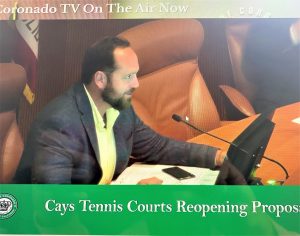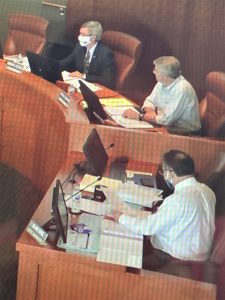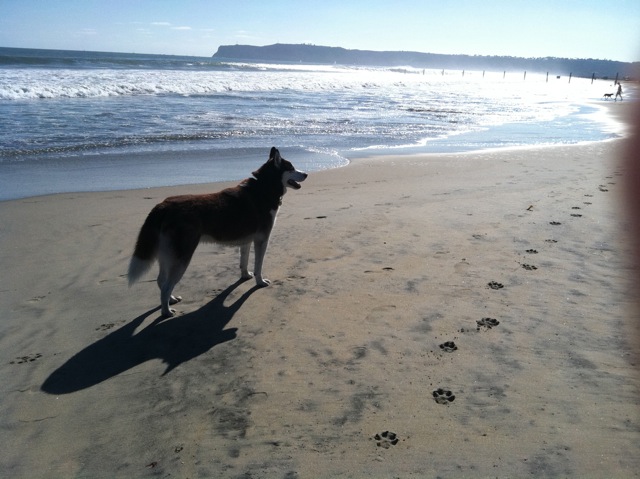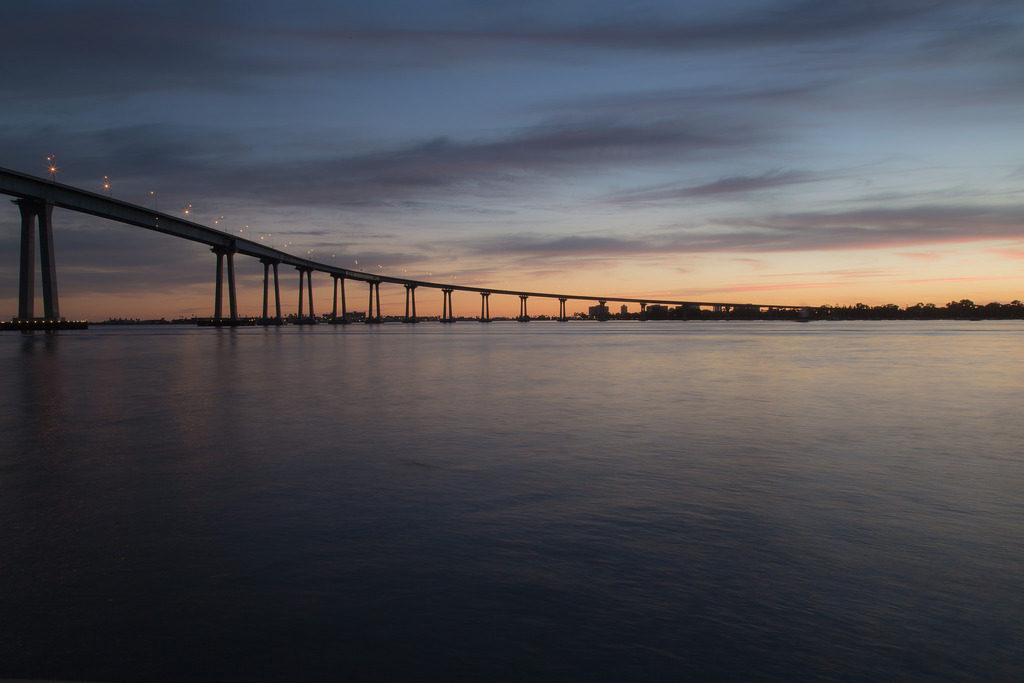City Manager Blair King had lots of positive community updates to share in his opening report. Dog lovers will be ecstatic to learn that Dog Beach and Sunset Park will be reopening this Thursday, June 4. There is still no word from the county on when community pools can reopen.
 Tennis lovers will be able to play again at the Cays Tennis Courts starting Saturday, June 5, with it being open on Tuesdays, Thursdays, and Saturdays from 8 am to 1 pm. A pop-up tent will be erected for monitoring and observation. The same rules apply as for the Glorietta Tennis Courts with single play, and doubles if players are in the same household. Reservations are required with a nominal $5 fee. Private lessons will now also be allowed at both courts, but can only be reserved 24 hours in advance with time slots after 10 am.
Tennis lovers will be able to play again at the Cays Tennis Courts starting Saturday, June 5, with it being open on Tuesdays, Thursdays, and Saturdays from 8 am to 1 pm. A pop-up tent will be erected for monitoring and observation. The same rules apply as for the Glorietta Tennis Courts with single play, and doubles if players are in the same household. Reservations are required with a nominal $5 fee. Private lessons will now also be allowed at both courts, but can only be reserved 24 hours in advance with time slots after 10 am.
King noted that on May 22, the city did a handshake agreement with the Port of San Diego to open their parks, specifically Grand Caribe, Tidelands, and the park in front of the Ferry Landing. The Port cited increased costs for keeping the parks closed, so the city stepped in to offer monitoring three times per day and additional sanitization of the restrooms. The cost to the city will be approximately $3790 per month.
Kudos were given to Police Chief Chuck Kaye and Fire Chief Jim Lydon for their work in keeping Coronado safe during the protests over the past few days and noted that both of their departments have increased staffing. Coronado is coordinating with other regional agencies to monitor the situation countywide. King said that Sunday afternoon CHP and Coronado Police Officers were able to prevent about 300 people from crossing the bridge with it remaining closed until 2 am on Monday morning. It was closed again on Monday afternoon, based on regional intelligence. He noted that there is respect for peaceful protests, but “our emphasis is to de-escalate the situation.”
Councilmember Sandke shared Police Chief Kaye’s Facebook post: “We are shocked and saddened and share your deep concerns over the tragic death of George Floyd. As the world responds to the tragic injustice to #GeorgeFloyd, we want our community to know we are committed to protecting free speech, keeping our citizens and businesses safe, and supporting peaceful protests. Please know that the Coronado Police Department stands in solidarity with the fight against systemic racism. We are taking this time to learn and listen.”
In response to the council’s discussion at the last meeting, the city has reached out to local restaurants to work with them on a one on one basis to help come up with solutions to utilize additional spaces to increase occupancy. Five restaurants have contacted the city thus far and filled out the simple form for help. King noted that he has seen several restaurants be creative in figuring out solutions and cited Buona Forchetta for using their parking lot for additional outdoor dining. Some restaurants have expressed that they are waiting until July to reopen as they work on staffing, supply chain and sanitizing issues. “The door is still open to all restaurants. We will be happy to work with everyone to expand,” he commented.
Director of Administrative Services Jim Krueger gave an update on the 2020/21 budget, based on Council recommendations at the last meeting. The Council unanimously approved the three resolutions which included adopting the budget and capital projects, approving the annual expenditure limit, and establishing the Fund Balance and reserve amounts. He gave the following summary: General Fund Revenues will be $48,910,000 with General Fund Expenditures of $55,408,062. The All Fund Revenue Projections are $87,005,772 with All Fund Expenditures of $93,513,522. He said the General Fund has increased by $83 million dollars in the last nine years, and said that even with this year’s downturn there will be no cuts to major services and “The net bottom line is still in good shape.”
City Manager King discussed the Relinquishment Roadway Fund which will need an estimated $30 to $33 million, saying that the goal was to create an account that would be a long-term endowment for the perpetual maintenance if the city takes over the roadways from Caltrans. This will be presented in more detail at the June 15 council meeting, and he added, “This would give us self-determination over our city streets without placing the burden on the city budget.”
Senior Planner Jesse Brown outlined the changes for Accessory Dwelling Units (ADU) and Junior Accessory Dwelling Units (JADU) to meet new state legislative updates. These recommendations came after being approved by the Planning Commission.
State law now requires all cities approve ADUs and JADUs under the following four circumstances:
- The conversion of existing space in a single-unit residence to provide either an ADU or a JADU. In this case, only one ADU or JADU is allowed.
- The conversion of existing space in a single-unit residence to build a JADU and construct a new detached ADU. In this case, both an ADU and JADU are allowed.
- The conversion of non-habitable space, such as garages, storage rooms, etc. in a multiple unit dwelling property into ADUs. The number of ADUs on the property may not exceed 25 percent of the total number of units. A minimum of one ADU will be allowed and JADUs are not permitted.
- The construction of two-detached ADUs on the same property as a multiple-unit dwelling. JADUs are not permitted.
State law now mandates attached ADUs that are converted from existing spaces shall not exceed 50 percent of the primary dwelling unit square footage, with garage not included in this calculation. New construction attached and detached ADUs can be limited to 850 square feet for studio and one-bedroom units, and 1,000 square feet for two or more-bedroom units. The FAR and site coverage requirements for the zone of the property are still applicable. JADUs are limited to a maximum of 500 square feet. There is a 16-foot height limit, unless the ADU is attached to the primary dwelling, and parking requirements require one space, covered or uncovered, per ADU and none for JADUs.
This issue gets a bit tricky because Coronado is located in a Coastal Zone, and City Attorney Johanna Canlas said, “The city is trying to find a balance between the Coastal Commission and state laws.” She also referred to a letter that had been received one hour prior to the meeting from a housing organization citing concerns over parking requirements and indicated she look into it. Councilmember Sandke said, “We are working to maximize local control from state government.” When the discussion of how this impacted floor area ratio (FAR) on basement ADUs, Canlas pointed out that was a different ordinance and discussion. Councilmember Benzian had to recuse himself for this issue which was approved by the council.
Director of Engineering Ed Walton gave a presentation on the TransNet local street improvement program for 2021 through 2025. He cited that the city expects to receive $3.5 million in TransNet funds over the next five years, with $600,000 coming in 2021. These monies will go to fund regular road maintenance, including the slurry seal program, which is done on a seven-year cycle, and the curb and gutter replacement needs, which are done based on age and condition. He noted that Coronado tries to keep the roads at a Pavement Condition Index (PCI) index of 80.
 Mayor Bailey said he recently attended an EPA kick off meeting where a timeline for implementing solutions to the Tijuana Sewage crisis was laid out. He emphasized that they are not starting from scratch, but rather enhancing other projects in place. They are hoping to start as soon as 12 to 18 months, with ongoing meetings on this issue. Councilmember Heinze gave committee reports on the Energy Environment and National Resources Committee, which is updating and resubmitting their resolution for monies to go toward border water projects to continue to put the pressure on the government to do something about this vital issue. He also said the National League of Cities Committee is launching a “Cities are Essential Campaign”. They project 300,000 to one million city employees will be laid off, $134 billion in revenues will be lost, and cities will be down an average of 21 percent due to the pandemic.
Mayor Bailey said he recently attended an EPA kick off meeting where a timeline for implementing solutions to the Tijuana Sewage crisis was laid out. He emphasized that they are not starting from scratch, but rather enhancing other projects in place. They are hoping to start as soon as 12 to 18 months, with ongoing meetings on this issue. Councilmember Heinze gave committee reports on the Energy Environment and National Resources Committee, which is updating and resubmitting their resolution for monies to go toward border water projects to continue to put the pressure on the government to do something about this vital issue. He also said the National League of Cities Committee is launching a “Cities are Essential Campaign”. They project 300,000 to one million city employees will be laid off, $134 billion in revenues will be lost, and cities will be down an average of 21 percent due to the pandemic.
City Attorney Canlas said that Coronado is part of the Western Communities Coalition, who filed an opposition letter yesterday to ask the FCC to delay moving forward with new telecommunications issues due to the pandemic.
There was a total of 20 public comments received before the council meeting with 14 of them regarding updating the turf for the Lawn Bowling Club at the Spreckels Center. When Councilmember Heinze asked about this project, City Manager King said it is already being looked at by in-house design personnel with several key issues to consider, like options for draining the water and solving the fungus problem, before new turf can be installed. He anticipates a plan will be ready to bring back to the council at the end of first quarter 2021 and said, “There is the impression that no work is being done, but I can say the pace of this project is good.”
Other public comment letters included the parking on Ocean Blvd, opening the tennis courts, pools, and dog beach, and the bridge closures. These are available for viewing on the city website.
 EDCO CEO Steve South and Division Manager Carl Scherbaum came to the meeting to give a presentation on their efforts to reach “zero waste” for our community by recycling organics into natural gas that will be used to power their trash collection vehicles. They began constructing chambers in February and hope to have the anaerobic facility functional by early 2021. When Councilmember Sandke asked about rate increases, he learned that residents will only pay an additional $2.68 per month for this new service. EDCO plans to send out mailers and host community meetings to educate the community on this important environmental project. King said, “This is part of our long-term effort for sustainability,” and noted there is a better way to dispose of a banana peel. The mayor thanked EDCO for being a great community partner.
EDCO CEO Steve South and Division Manager Carl Scherbaum came to the meeting to give a presentation on their efforts to reach “zero waste” for our community by recycling organics into natural gas that will be used to power their trash collection vehicles. They began constructing chambers in February and hope to have the anaerobic facility functional by early 2021. When Councilmember Sandke asked about rate increases, he learned that residents will only pay an additional $2.68 per month for this new service. EDCO plans to send out mailers and host community meetings to educate the community on this important environmental project. King said, “This is part of our long-term effort for sustainability,” and noted there is a better way to dispose of a banana peel. The mayor thanked EDCO for being a great community partner.
After some discussion, the council approved the cancellation of the July 7 and August 4 council meetings but decided this can be changed if needed.
Items of note unanimously approved on the Consent Calendar:
- Suspend the Coronado-centric COVID-19 Serology Testing program until there is a greater understanding what the results mean.
- Approval of a letter in support of the County of San Diego’s efforts to move into a phase three pilot program so more local businesses can safely be reopened.
- Adoption of resolution for the General Election on November 3, 2020.






